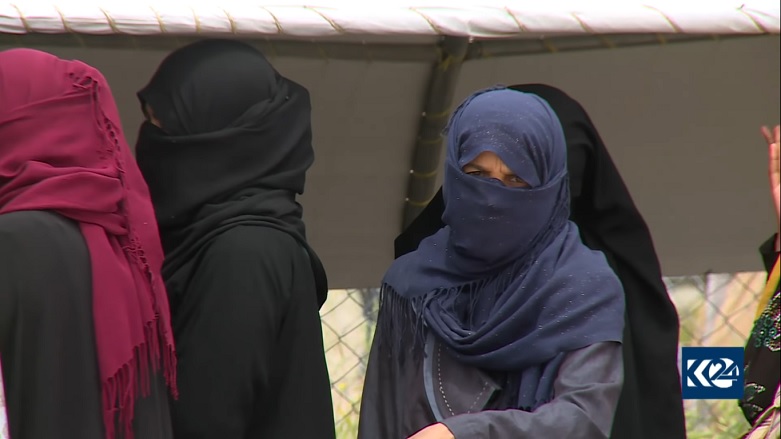Wives of ISIS fighters find camps safe haven, fear violence from Iraqis outside

ERBIL (Kurdistan 24) – Many wives of Islamic State fighters in Iraq say displacement camps are the safest place for them to avoid violent retribution or other persecution at the hands of other Iraqis and also that they are very concerned about the fate of their children, many of which have been denied crucial identity documents.
The Hassan Sham camp, located on the outskirts of the Kurdistan Region’s Erbil, is one of the facilities that host thousands of displaced Iraqis, among them a high percentage of the women.
One who gave her name only as Menal was married in Mosul and had three boys and a daughter before the emergence of the Islamic State in 2014. After it took over the city, she said, various events led to her divorcing her husband and marrying an American fighter for the extremist group, with whom she had another daughter.
“I had to marry him because I had no one to take care of my children,“ Menal told Kurdistan 24 on Friday. “My husband was an ISIS cleric and now he is arrested and sentenced by the court.”
She said that she has little hope for her future and that of her children because she cannot go back to Mosul as she could be murdered for being an Islamic State wife.
Menal is also worried about her youngest child, stating that the girl has no official birth documents and as a result would be deprived of many rights, including being allowed to attend school.
Sakine is another woman in the camp, originally from Syria. She married a former Iraqi soldier in 2012 who served under the authoritarian rule of Saddam Hussein before joining the Islamic State in 2014.
“I have so much fear that I will be killed should I leave this camp because my husband was not just a normal ISIS fighter, but also occupied the lands of his uncles,” Sakine told Kurdistan 24 in Hassan Sham camp.
“I can’t go back to Syria because I will have no rights there either,” she added.
There is major controversy about how to deal with families of Islamic State fighters and those who lived under their rule. Local security forces and residents of areas liberated from its brutal rule are hostile toward families with a perceived connection to the group and say they will not allow their return to the region to live among the general population.
Now, Iraqi officials are pushing for the creation of a new detention camp aimed at isolating as many as 30,000 Iraqis who were captured in the last territory Kurdish forces liberated from the Islamic State in Syria in late March.
“The goal is to select a special place to contain those people,” said one official, as quoted by The Washington Post recently. “It’s for security reasons, but also to keep them alive. If they return to their areas, they’ll be singled out for revenge attacks by people who lost relatives to the Islamic State.”
Last week, Human Rights Watch (HRW) slammed the move and stated that the Iraqi government’s proposed plan to confine families of members of the Islamic State is a violation of international law.
“Detaining families not accused of any crimes is a form of collective punishment that will fuel resentment and put the lives of thousands of people on endless hold,” said Lama Fakih, deputy Middle East director at HRW.
In late April, the Norwegian Refugee Council (NRC) warned that an estimated 45,000 children born under Islamic State rule who are already housed in various displacement camps in Iraq are missing civil documentation and may face total exclusion from Iraqi society, including being barred from attending school, denied access to healthcare, and deprived of their most basic rights.
As they reach adulthood, these children risk being denied state-recognized marriages, owning property, or even being formally employed.
Editing by John J. Catherine
(Additional reporting by Blessa Shaweys)
